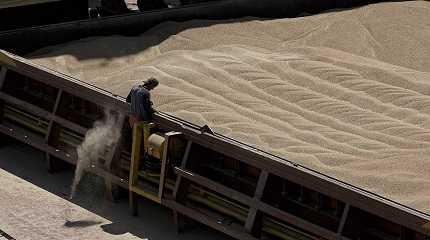
ANKARA, April 30. /TASS/: Representatives of Russia, Ukraine and Turkey at the level of deputy ministers will discuss extension of the grain deal, which expires on May 18, in coming days, Turkish Defense Minister Hulusi Akar said in an interview with the Haberturk TV channel on Sunday.
"We continue contacts with the Russian and Ukrainian sides. We agreed on a meeting between representatives of Russia, Ukraine and Turkey at the level of deputy ministers in coming days for discussing the issues related to the grain initiative," he said without specifying where such a meeting is planned.
The issue of the grain deal’s extension was discussed during the phone talks between Turkish and Russian presidents, Tayyip Erdogan and Vladimir Putin, earlier this week. Kremlin Spokesman Dmitry Peskov said on Friday that the Istanbul agreements were not fulfilled regarding the terms concerning Russia, adding that in this respect the prospects of extending the deal were not very good. According to the newspaper Hurriyet, the Turkish side will discuss the issue with representatives of the UN, the US and the UK in coming days.
Agreements on the export of food from Ukraine were concluded on July 22, 2022, for 120 days and extended in November for the same period. One of the agreements regulates the order of grain supplies from the Kiev-controlled ports of Odessa, Chernomorsk and Yuzhny. Moreover, a memorandum was inked by Russia and the UN on lifting export restrictions for Russian agricultural products and fertilizers to global markets. Moscow notes that the second part of the agreement is not being implemented. On March 18, Russia announced that the deal was being extended for 60 days, warning that this would be enough time to assess the efficacy of the memorandum signed with the UN. The Russian Foreign Ministry also noted that the future decision on the deal’s extension would depend on connection of Rosselkhozbank back to SWIFT, resumption of supplies of agriculture equipment, components and service maintenance, lifting of restrictions on insurance and reinsurance, lifting of the ban on access to ports, resumption of the work of Tolyatti-Odessa ammonia pipeline, unfreezing of foreign assets and accounts of Russian companies related to production and transportation of food and fertilizers.




